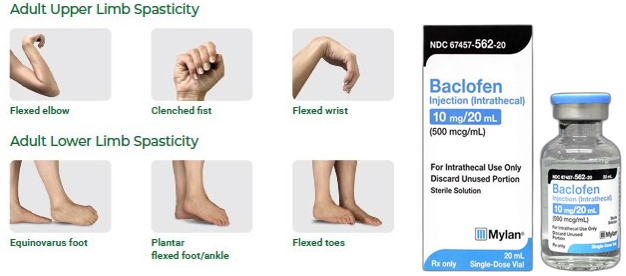A client with muscle spasticity receives a prescription for baclofen. Which information provided by the client requires additional instruction by the nurse?
Use stool softener as needed.
Avoid ingestion of alcohol.
Discontinue when spasms cease.
Take medication with meals.
The Correct Answer is C
Baclofen is a muscle relaxant medication used to treat muscle spasticity, which is a condition that causes muscles to become stiff and rigid. It works by reducing the activity of nerves in the brain and spinal cord that cause muscle spasms.
Option a, using stool softener as needed, is appropriate because baclofen can cause constipation as a side effect.
Option b, avoiding ingestion of alcohol, is also appropriate because alcohol can increase the sedative effects of baclofen and cause drowsiness or dizziness.
Option d, taking medication with meals, is recommended because it can help reduce stomach upset and nausea that may occur as a side effect of the medication.
Option c, discontinuing the medication when spasms cease, is incorrect because muscle spasticity is a chronic condition, and baclofen is used to manage symptoms over a prolonged period. Discontinuing the medication abruptly can cause withdrawal symptoms and exacerbate the spasticity. Therefore, the nurse should educate the client to take the medication as prescribed by the healthcare provider and not discontinue it without medical advice.

Nursing Test Bank
Naxlex Comprehensive Predictor Exams
Related Questions
Correct Answer is B
Explanation
Orlistat works by inhibiting the absorption of dietary fat in the intestines. The side effects of faty stools and flatus can be managed by reducing the intake of dietary fat. The nurse should ask the client to describe her dietary intake history for the last several days to determine if she has been consuming a diet high in fat.
Based on this information, the nurse can provide appropriate dietary advice to help manage these side effects.

Correct Answer is D
Explanation
Anaphylaxis is a severe and potentially life-threatening allergic reaction that occurs rapidly after exposure to an allergen. The symptoms of anaphylaxis can vary but usually involve multiple organ systems, including the skin, respiratory, cardiovascular, and gastrointestinal systems.
Wheezing and dyspnea are two common symptoms of anaphylaxis that indicate the respiratory system's involvement.
Urticaria and pruritis are skin manifestations that can also be present in anaphylaxis, but they are not specific to this condition.
Insomnia and irritability are not typical symptoms of anaphylaxis.
Tinnitus and diplopia are also not common symptoms of anaphylaxis.

Whether you are a student looking to ace your exams or a practicing nurse seeking to enhance your expertise , our nursing education contents will empower you with the confidence and competence to make a difference in the lives of patients and become a respected leader in the healthcare field.
Visit Naxlex, invest in your future and unlock endless possibilities with our unparalleled nursing education contents today
Report Wrong Answer on the Current Question
Do you disagree with the answer? If yes, what is your expected answer? Explain.
Kindly be descriptive with the issue you are facing.
